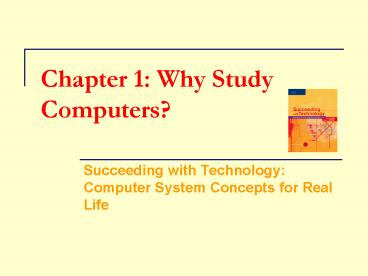Chapter 1: Why Study Computers - PowerPoint PPT Presentation
1 / 25
Title:
Chapter 1: Why Study Computers
Description:
Succeeding with Technology: Computer System Concepts for Real Life. 2. Objectives ... IT - Computer science; Management Information Systems ... – PowerPoint PPT presentation
Number of Views:52
Avg rating:3.0/5.0
Title: Chapter 1: Why Study Computers
1
Chapter 1 Why Study Computers?
- Succeeding with Technology Computer System
Concepts for Real Life
2
Objectives
- Describe the use of computer systems
- Define basic computer concepts
- Discuss the components of any computer system and
how they are used
3
What is the role of IS in todays competitive
business environment?
- Essential communication and analytical tools for
conducting trade and managing businesses. - Provide a foundation for new products/services
- Allow businesses to adopt flatter, more
decentralized structures and more flexible
arrangements of employees and management. - Organizations are trying to become more
competitive and efficient by transforming
themselves into firms where nearly all core
businesses and relationships with customers are
digitally enabled.
4
Key Terms
- Data vs. Information
- Computer vs. Computer Program vs. Information
Systems vs. MIS - Business Processes vs. Business Functions
5
Producing Valuable Information
- Data - Consist of raw facts
- Information - Collection of organized facts
- Knowledge - Information that has been organized
and processed to convey understanding,
experiences, accumulated learning.
6
(No Transcript)
7
The Interdependence Between Organizations and
Information Systems
8
- Information System - Interrelated components
working together to collect, process, store and
disseminate information to support decision
making, coordination, and control in an
organization - What exactly does an information system do?
- Provides an organizational and management
solution based on information technology to
address a challenge posed by the environment. - IS transforms raw data into useful information.
- Fixed definitions of data and procedures.
- The purpose of an IS is to collect, store, and
disseminate information from an organizations
environment and internal operations and to
support organizational functions and decision
making, communication, coordination, control,
analysis and visulation.
9
- Business Processes
- Unique ways in which organizations coordinate and
organize work activities, information, and
knowledge to produce a product or service . - Business Functions
- Specialized tasks performed in a business
organization, e.g. manufacturing and production,
sales and marketing, finance and accounting, and
human resources.
10
How are information systems transforming
organizations and management?
- Information systems are more than just computers
- The widening scope of information systems
- Flatting organizations
- Redesigned work flow
- Information Architecture vs. Infrastructure
11
Information Systems
12
The Widening Scope of Information Systems
13
Flattening Organizations Information Systems
14
Information Architecture and Information
Technology Infrastructure
15
How has the Internet and Internet technology
transformed business?
- What You Can Do on the Internet
- Communicate and collaborate
- Access information
- Participate in discussions
- Supply information
- Find entertainment
- New Options for Organizational Design
- Exchange business transactions
- Flattening organizations
- Separating work from location
- Reorganizing work-flows
- Increasing flexibility
- Redefining organizational boundaries
16
Productivity, Quality, and Competitive Advantage
- Productivity
- Measure of output achieved divided by input
required - Quality
- Ability of a product or service to meet or exceed
customer expectations - Competitive advantage
- A significant and long-term benefit
17
Careers and Computers
- IT - Computer science Management Information
Systems - Business Management Marketing Finance
Accounting Human Resources - Insurance
- Engineering Architecture
- Library science
- Science Sports and Exercise
- Medicine and Healthcare
- The Arts
- Social Sciences
- Education
- Law Enforcement Law
- The Government and the Military
18
Functions Performed by a Computer
- Input - determined by the desired output of the
system - Processing - transforming data into useful
outputs - Output - the production of useful information
- Feedback - Output used to make adjustments to
input or processing activities
19
Hardware
- Processing and storage
- Central processing unit
- Motherboard (system board)
- Memory (primary storage)
- Secondary storage (permanent storage)
20
Software and the Internet
- Two types of software
- Application
- System
- Operating system
- The Internet
- ISPs
- WWW
- URLs
21
Types of Computers
- Mobile computers
- Workstations
- Servers
- Midrange Servers
- Mainframe Servers
- Supercomputers
- Special-Purpose Computers
- Global positioning system (GPS)
22
Computer Systems and their Use
- People are the most important element in most
computer systems - Computer systems personnel
- Procedures
23
Database Systems
- Database Systems
- Telecommunications and Network Systems
- Electronic commerce (e-commerce)
- Transaction processing system (TPS)
24
Information, Decision Support, and Specialized
Systems
- Management Information System
- Decision Support Systems
- Artificial intelligence (AI)
- Expert system (ES)
- Other artificial intelligence and special purpose
systems - Geographic information system (GIS)
- Neural network
25
Social, Ethical, and Security Issues
- Computer Waste and Mistakes
- Computer crime
- Privacy
- Computer Systems in the Work Environment
- Ethical Issues in Computer Systems
- Computer Security and Control































